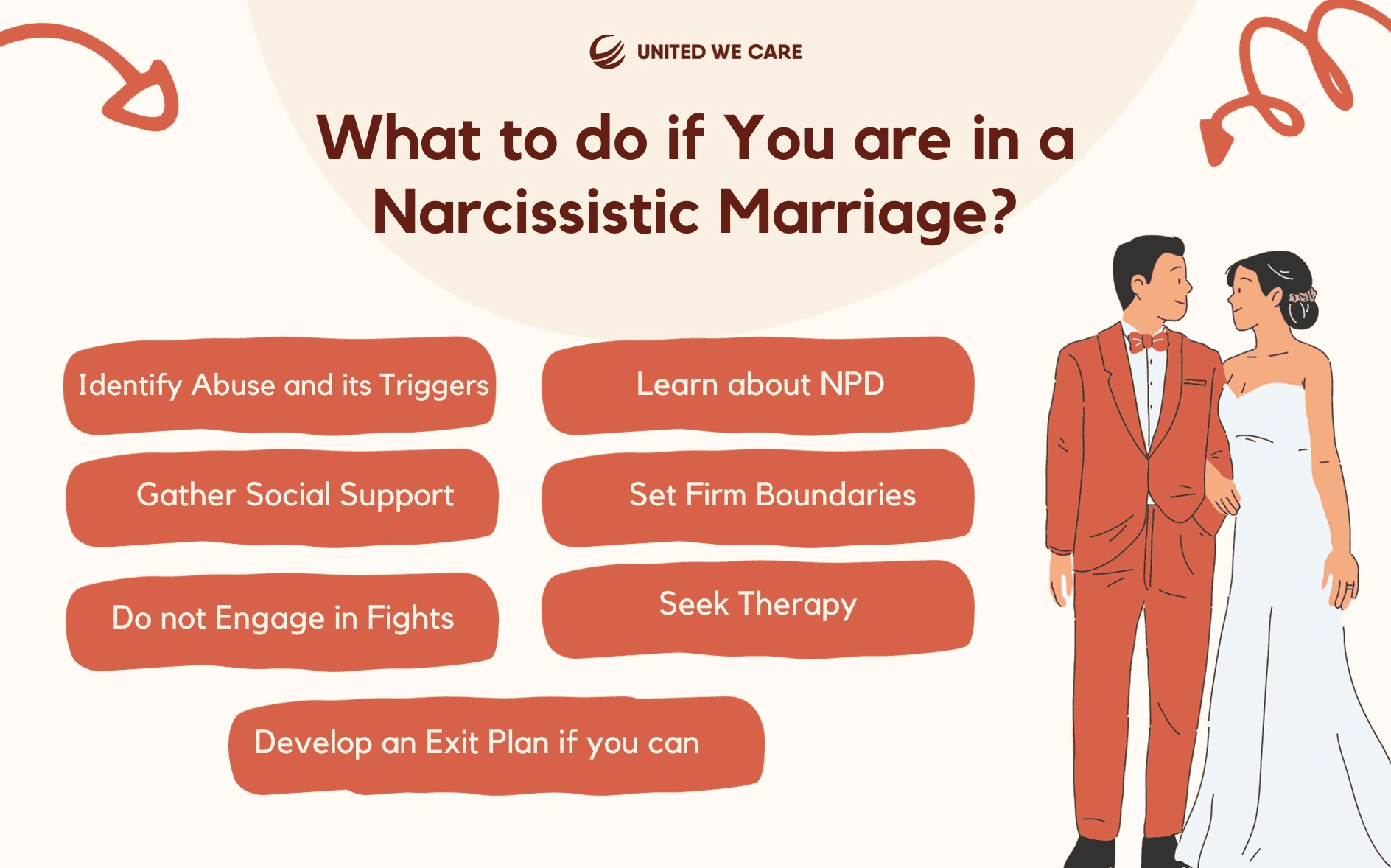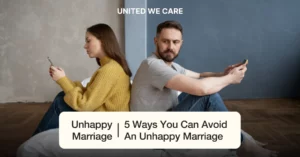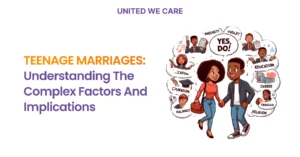Introduction
You met someone, and you hit it off. It might be sudden, but it seemed as if it was meant to be. You trusted them, and you felt grateful that they went out of their way to do so much for you. So you continued to trust them and be with them, but then, as the relationship grew, you were shown just how horrible you were to be with. Soon, the criticisms came in, and they grew into insults. Eventually, you started realising that there is significant gaslighting, you are now isolated, and a number of your spouse’s behaviours are abusive. Marriage with a narcissistic can seem to be a stroke of luck, but in reality, it is a situation which is difficult to deal with. This article delves into how to deal with a narcissistic marriage.
What is Narcissistic Marriage?
When you end up in a marriage with someone who has narcissistic personality disorder, your relationship can have a lot of turbulence and psychological abuse. People with Narcissistic Personality Disorder or NPD believe that they are grandiose and better than others. They have an exaggerated sense of self-importance, are often self-absorbed, lack empathy, and wish to be the centre of attention. To maintain their self-importance, they tend to belittle or undermine others [1]. Narcissists are known to create toxic environments in relationships, especially when these are close and personal relationships [2].
Relationships with narcissists often follow a pattern or a cycle with three phases [3]:
- Idealize: This is the honeymoon stage where the narcissist engages in behaviours like love bombing. They make you feel special; there is a rush of intimacy a lot of flattery, and they put you on a pedestal. The narcissist also shares a lot about them to engage your empathy and might talk of future or commitment. There is a testing of your boundaries, and if you are offended, a lot of hoovering and promises of changing to get you back.
- Devalue: When the relationship has deepened, and you make some form of commitment, the narcissist begins to provoke insecurity in you to gain power over you. This might begin with some “concern” about your behaviour but grow into criticism, comparison, gaslighting, isolation and triangulation. The narcissist challenges your sense of self and worth repeatedly.
- Discard: You might experience a more direct form of abuse and coercion in this phase. The narcissist will commit betrayal and might try to discard you. They may also try to love-bomb someone else and term you as crazy.
How to Know if You Are in a Narcissistic Marriage?
In terms of marital and romantic relationships, narcissists have a need to maintain their superiority. They cannot be vulnerable, and neither can they accept criticism or any type of fault. In fact, even the reality of other person is a threat to their view that they are the best. Hence, as the marriage progresses, they engage in a number of behaviours to maintain their power, belittle you, and be the one in control.
Some signs that show you might have married a narcissist are [4] [5]:
- They talk mostly about themselves, and your life or life story has little place
- You don’t feel a deep emotional connection.
- There is frequent criticism and gaslighting where they devalue your emotions, perceptions and even memory.
- They tend to isolate you and even control you or your resources like money.
- You sometimes get compliments, but only when they are pleased, others are around, or the compliments make them look good.
- Love bombings only happen when you threaten to leave. Otherwise, there is more hostility and less love.
- They treat you like a child or an object.
- They engage in verbal abuse and call you names or put you down, at times, publicly.
- When you criticise or find faults, you get an explosive reaction.
- You feel anxious, confused, and helpless at times. You might even feel like you are walking on eggshells around them as they are unable to please.
What are the Effects of a Narcissist Marriage?
Being in a marriage with a narcissist and bearing with the inevitable ‘narcissistic abuse’ can have severe consequences on you. Although there is limited research on it, the experience of being in a relationship with a narcissist can include, but is not limited to, the following [2] [6]:
- Psychological and, at times, physical abuse
- Loss of self-esteem, sense of self and reality
- Emotional dysregulation
- Confusion, shame, and blame
- Depression
- Anxiety or fear
- Helplessness and hopelessness
- Loss of social support
- Other mental health disorders
- PTSD or Complex PTSD
What to do if You are in a Narcissistic Marriage?

Dealing with a narcissist can be difficult. This is especially true because, for you, the person might be someone you actually fell in love with or are still in love with. However, it is important to know that you can have a better quality of life and end the effects of abuse. Some ways to deal with a narcissistic spouse are [5] [7]:
- Identify Abuse and its Triggers: In marriages where narcissistic abuse is happening, it can feel as if this is the norm. The first step is to identify this as abuse and recognise when it occurs. It is important to remember that you are not to blame, and it is the narcissist’s inability to manage their triggers which causes this.
- Learn about NPD: Spend some time reading about NPD and watching videos about it. This will help you identify closely the behaviors and patterns of a narcissist. It will also help you avoid traps that can lead to abuse.
- Gather Social Support: Narcissists isolate you and make you feel as if you are dependent on them. Try to gather social support. Reach out to friends or family or even support groups and share your experiences. This will provide you with a safety net and validation to stand up to the abuser.
- Set Firm Boundaries: You do not need to tolerate abuse, rage or tantrums. You can set firm boundaries about what behaviours are inappropriate and what consequences will be if the narcissist engages in those behaviours. Remember that the narcissist will try to challenge these boundaries and will not respect them; it is you who will have to enforce them.
- Do not Engage in Fights: Narcissists have a number of techniques in their toolkit to win. If you engage in a fight or argument, chances are you will be the one who will lose. Try to avoid fights and exit situations if possible.
- Seek Therapy: Focus on your healing and recovery. Seek professional help to re-learn your self-worth and learn more strategies to deal with narcissists. Some people also seek couples therapy if they think that there is a chance that the person with NPD will improve.
- Develop an Exit Plan if you can: While it is tough and, in some situations, dangerous, if you can leave, then exit the relationship. Try to gather some support and strength before doing this. Develop an exit plan, which involves finding a place to stay, dealing with lawyers, sorting out finances, etc. When you leave, chances are the love bombing can begin with a lot of hoovering and emotional manipulation. Limit contact to avoid this.
Conclusion
Being in a narcissistic marriage can be a traumatic experience. You might face abuse and experience depression, anxiety, confusion, helplessness, and even PTSD after you leave. Narcissists make relationships toxic and a space where they play power games. However, you have the option of setting boundaries and standing up to them. When you focus more on yourself and your reality, ensure that you have support and set firm boundaries, there is little a narcissist can do apart from throwing tantrums.
If you are someone who might be in a narcissistic marriage and are looking for support, contact our experts at United We Care. At United We Care, we are committed to providing you with the best solution for your overall well-being.
References
[1] G. Lay, “Understanding relational dysfunction in borderline, narcissistic, and antisocial personality disorders: Clinical considerations, presentation of three case studies, and implications for therapeutic intervention,” Journal of Psychology Research, vol. 9, no. 8, 2019. doi:10.17265/2159-5542/2019.08.001
[2] N. M. Shousha, “Now, You Can Breathe: A Qualitative Study of the Experiences and Resilience of E Resilience of Egyptian W gyptian Women Victimiz omen Victimized by Narcissistic cissistic Relationships ,” Journal of International Women’s Studies:, vol. 25, no. 1, 2023. Accessed: 2023. [Online]. Available: https://vc.bridgew.edu/cgi/viewcontent.cgi?article=3043&context=jiws
[3] T. Gaum and B. Herring, “Cycle of narcissistic abuse,” Tanya Gaum, Psychotherapy, https://www.tanyagaum.com/cycleofnarcissisticabuse (accessed Oct. 2, 2023).
[4] H. Pevzner, “Signs you’re married to a narcissist—and what to do about it ,” Psycom, https://www.psycom.net/narcissist-signs-married-to-a-narcissist (accessed Oct. 2, 2023).
[5] M. Holland, “15 signs you’re married to a narcissist & what to do about it,” Choosing Therapy, https://www.choosingtherapy.com/married-to-a-narcissist/ (accessed Oct. 2, 2023).
[6] S. Shalchian, Clinician’s Recommendations in Treating Victims and Survivors of Narcissistic Abuse, 2022. Accessed: 2023. [Online]. Available: https://scholarsrepository.llu.edu/cgi/viewcontent.cgi?article=3542&context=etd
[7] A. Drescher, “Narcissistic marriage problems & how to deal with them,” Simply Psychology, https://www.simplypsychology.org/narcissistic-marriage-problems.html (accessed Oct. 2, 2023).










